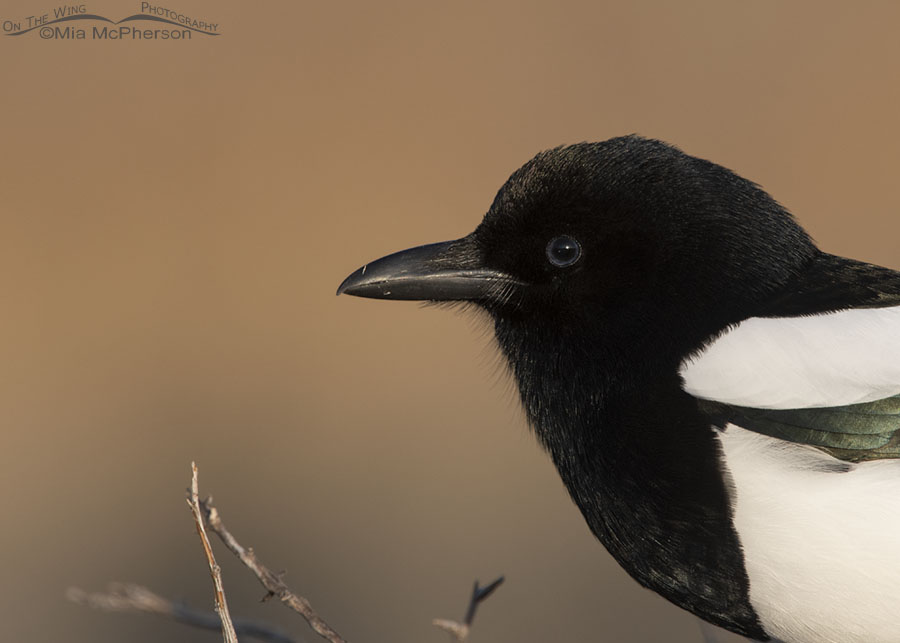 Immature Black-billed Magpie portrait at sunrise – Nikon D500, f10, 1/500, ISO 500, -1.0 EV, Nikkor 500mm VR with 1.4x TC, natural light
Immature Black-billed Magpie portrait at sunrise – Nikon D500, f10, 1/500, ISO 500, -1.0 EV, Nikkor 500mm VR with 1.4x TC, natural light
I was looking through my archives yesterday when I came across this immature Black-billed Magpie portrait taken at sunrise on Antelope Island State Park. I loved the warm glow from the sun on the features in the background, the light in the eye of the magpie, and the wonderful details in the feathers of this young bird.
You might wonder how I know that this is an immature Black-billed Magpie when viewing this photo. It is all in the eyes. Adult Black-billed Magpies have dark eyes. Most of the time I can’t see where the irises end and the pupils begin they are so dark. Immature Black-billed Magpies have bluish-gray irises and that can be seen in this photo. Hatch year birds start to get darker irises by December. This Black-billed Magpie portrait was taken in November of 2016.
I’ve found that people either hate Black-billed Magpies or love them. I am in the love them camp. I enjoy photographing magpies year round here in northern Utah but my favorite time of the year to photograph them is when they start building their nests in late winter into early spring. It can take as long as 50 days for Black-billed Magpies to build their dome-shaped nests which means I can have many opportunities to photograph them from a respectful distance as they fly in and away from their nests.
I also think it is a real treat to listen to these magpies communicate with each other through their calls. It would be thrilling to understand “magpie” and to know what they are saying to one another when I am in the field with them.
I felt fortunate to take this portrait of the young Black-billed Magpie. It was very chilly at sunrise that morning and the bird was stickier than it may have normally been.
Life is good.
Mia
Click here to see more of my Black-billed Magpie photos plus facts and information about this species.


Wow! The details on the feathers are amazing! 🙂
I love these elegant racals….thankd…..
What a beauty. While they are completely different birds I LOVE our magpies and am sure that I would love yours too.
I love them but this summer boy was I inundated, 30-50 juveniles living in the yard. I did not weather or release a single magpie from rehab this year but about 20 last year. I think all the orphans we raised and released last year brought their young to our yard for food when they fledged. I still have 3-4 who have stayed. They get the home made suet in the feeders quickly every morning when I put it out. I have had to buy a few suet feeders designed to thwart starlings, the magpies have not figured out how to hang upside down for yet.
Enjoy reading your posts.
Put me in the love them camp, too. They are beautiful, clever, loud, and entertaining. When I worked in a national park, I found that guests were often afraid of them due to their noisy sounds and willingness to get close to people. My fellow employees often called them trash in a tuxedo. I’ve always enjoyed them and their chatter, and, like you, I’ve been lucky to watch them build a nest. Great bird, lovely photo.